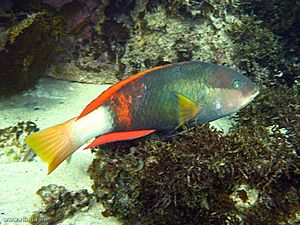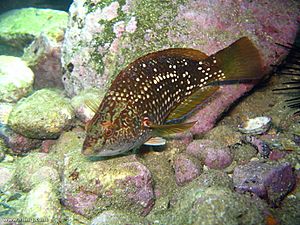Crimson banded wrasse facts for kids
Quick facts for kids Crimson banded wrasse |
|
|---|---|
 |
|
| male | |
 |
|
| female | |
| Conservation status | |
| Scientific classification | |
| Synonyms | |
|
The Notolabrus gymnogenis, also known as the crimson banded wrasse, is a type of fish. It belongs to the Labridae family. This colorful fish lives only in Eastern Australia.
Contents
About the Crimson Banded Wrasse
What Does It Look Like?
This fish can grow to about 40 centimeters (about 16 inches) long. Like many wrasses, its colors change as it gets older. Young fish are greenish-brown with white spots.
Female wrasses are reddish to brownish-orange. They also have rows of white spots along their sides. Males are much brighter. They have red fins and a red band near their tail. Their tail fin is yellow. The biggest male ever recorded was about 23 centimeters (9 inches) long.
Where Does It Live?
You can find the crimson banded wrasse in the ocean waters along the coast of eastern Australia. They live from Hervey Bay, Queensland, down to Lakes Entrance, Victoria. They are also found in Tasmania. Sometimes, they are seen near Lord Howe Island too.
How Does It Behave?
Male crimson banded wrasses are very protective of their space. They will defend their territory from other males. These fish are also special because they are born female. Later in life, they can change into males. This usually happens when they are about 13 to 20 centimeters (5 to 8 inches) long.
Males often gather a group of about 10 females and young fish in their territory. This fish lays eggs to reproduce. They form pairs when it's time to lay their eggs.
Where Is Its Home?
Crimson banded wrasses live on coastal reefs. You can often find them on reefs in New South Wales. They live in waters that are about 4 to 53 meters (13 to 174 feet) deep.
What Does It Eat?
The crimson banded wrasse mostly eats small creatures that live on the ocean floor. Young wrasses mainly eat tiny crustaceans called amphipods. Larger wrasses eat bigger things. Their diet includes decapods (like crabs and shrimp), gastropods (snails), and bivalves (like clams).
How Do Humans Use This Fish?
People sometimes catch the crimson banded wrasse for fun, as part of recreational fishing. This fish has also been sold in fish markets. For example, it was recorded being sold at the Sydney Fish Market in 2005.
See also
 In Spanish: Notolabrus gymnogenis para niños
In Spanish: Notolabrus gymnogenis para niños


